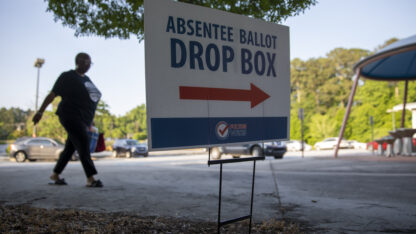If it was up to Mary Paris, Georgia’s 2022 elections would be a referendum on abortion.
As she watched her grandchildren play in a park in an upscale Atlanta suburb, the nurse practitioner said forcing women to give birth to unwanted children is “despicable.”
Paris is one of many women mobilized into politics by the 2016 election of Donald Trump.
Now she knocks on doors for Democrats, and said Republicans should take the blame for the U.S. Supreme Court decision that cleared the way for a 2019 Georgia law that bans most abortions once a “detectable human heartbeat” is present. Cardiac activity can be detected in an embryo as early as six weeks into pregnancy.
“They allowed this to happen, and by ‘this,’ I’m not just talking about Trump,” Paris said. “I’m talking about the repeal of abortion and whatever the hell is next.”
With polls showing the Supreme Court decision overturning Roe v. Wade is unpopular with a majority of Americans, Democrats see an advantage to focusing on their support for abortion rights – particularly in battlegrounds that President Joe Biden narrowly won over Trump in 2020.
In places where Democrats are trying to gain seats — U.S. Senate races in Ohio, Pennsylvania and Wisconsin, for example, and the governor’s mansion in Arizona — the party hopes anger from its liberal base and swing voters over the Roe reversal can overcome widespread frustration over inflation and Biden’s dreadful approval ratings.
In Georgia, the outcome of that gambit could determine a U.S. Senate seat where Republican Herschel Walker is challenging incumbent Democrat Raphael Warnock, and decide whether Democrat Stacey Abrams seizes the governor’s chair from incumbent Republican Brian Kemp.
This eastern section of Cobb County, with more affluent, highly educated residents, is a prime example of a place where some might forsake the Republicans’ message that Democrats are to blame for inflation and an uncertain economy.
Homes selling for $500,000 and up are tucked in cul-de-sacs in subdivisions such as The Estates and Heritage Glen.
In the nicest of the strip malls, a Warby Parker eyeglass store will soon join a Kendra Scott jewelry store. Public schools are the crown jewels of a community that is richer, whiter and much more college-educated than Georgia overall.
While East Cobb is still majority Republican, Democrats made inroads as they began winning majorities overall in Cobb County, once the flagship of the state GOP.
However, for every person like Paris, there may be one like Jenna Dorme.
Dorme says she feels torn between the two parties and supports both abortion rights and gun rights, but she said she doesn’t vote because she doesn’t see the point.
“You vote for someone, they promise: ‘This is never going to happen,’ and then it does,” Dorme said.
That’s in line with a recent Associated Press-NORC Center for Public Affairs Research poll that shows that while most Americans are unhappy with the Supreme Court decision, half say they feel at least somewhat anxious or hopeless — a warning sign for Democrats who hope to use anger to motivate voters.
But the same poll shows college-educated voters, like those that dominate East Cobb, are more likely than those without degrees to say abortion should be legal most or all of the time.
So some Democrats argue abortion rights might be a winning issue for them. In a previous incarnation of American politics, it was anti-abortion fervor and pro-gun politics that powered Republican campaigns.
Now, as the GOP campaigns on the price of gas and groceries, Democrats like Abrams declare themselves “enraged” and appeal to voters to prioritize social issues like abortion.
“Things go up, things go down. But this law is permanent. Unless we have new leadership, this law will govern their lives, the lives of their daughters, the lives of their friends,” Abrams said hours after the 11th U.S. Circuit Court of Appeals put the law into force last week. “And I would say to balance whether your immediate concerns about money outweigh your concerns about your constitutional, protected rights.”
Only 3% of Georgia voters surveyed by AP’s VoteCast said abortion was the most important issue in the 2020 election, and only 2% in 2018.
Some active in the anti-abortion movement, like Georgia Life Alliance Executive Director Martha Zoller, a longtime Republican and radio talk show host, believe other issues will dominate voters’ minds.
“I really think when it comes right down to it, these these issues related to education, the economy, inflation, just getting through day-to-day, the housing market, those are going to far outweigh for people with families,” Zoller said. “And that’s a lot of East Cobb folks.”
State Rep. Ed Setzler, who drafted the 2019 law, represents another part of Cobb County. He noted that he squeaked out a 280-vote majority in 2020 even as Trump lost his district.
“They spent $500,000 to utterly destroy me and we won, because people are not as pro-abortion as they think they are,” said Setzler, who is likely to be elected to the state Senate in November. “It’s not the motivating issue for the average Democratic voter that it is for activists.”
But a few Republicans who represent the area have long been less than absolutist on abortion. State Rep. Sharon Cooper, who represents much of East Cobb, voted against the law that took effect last week.
The measure passed through the House committee she chairs, where the retired nurse softened it by including a clause that says abortions are allowed for “medically futile” pregnancies if “an unborn child has a profound and irremediable congenital or chromosomal anomaly that is incompatible with sustaining life after birth.”
That’s a pattern for Cooper, who describes herself as pro-life, but has repeatedly expressed qualms about legislation sought by anti-abortion groups. She’s been unsuccessfully targeted by abortion hardliners in past GOP primaries.
Democrats narrowly missed beating Cooper in 2018 and 2020, before her district was redrawn to include more reliably Republican territory.
“Most people will tell you they’re pro-life, and like me, they wish that every child was wanted and born into a loving family. But that’s not always the way it happens,” Cooper said. “Given those circumstances, they don’t want abortion to be totally not available.”
But anti-abortion groups say their voters want total bans. Abigail Darnell, the vice president of Georgia Right to Life, said “true justice” demands that all fetuses be protected, arguing that allowing abortions if a fetus has Down syndrome, for example, won’t persuade voters.
“You’re not going to win hearts and minds with an inconsistent position,” said Darnell, who lives in western Cobb County.
Her group is petitioning the governor to call an election-year special session to seek a state constitutional amendment to ban all abortions.
Kemp shows no inclination to seek more restrictions immediately, couching his support for Georgia’s restrictions in a program he says supports women and families.
Kemp’s campaign is generally skirting abortion, emphasizing his stewardship of the economy and bashing Abrams as too liberal. Even Paris fears Democrats may not be able to make abortion the central issue.
“I think it will be down on the list, like No. 3 or No. 4,” Paris said. “Hopefully it will be enough to drag the younger demographic out.”









